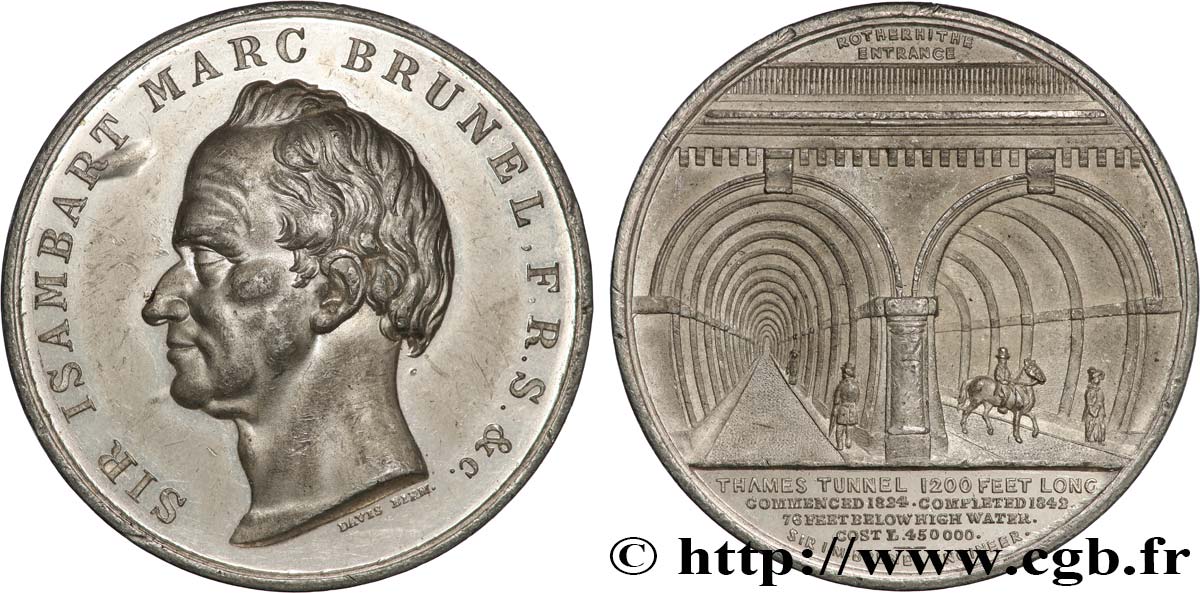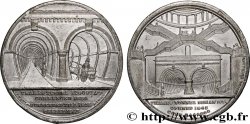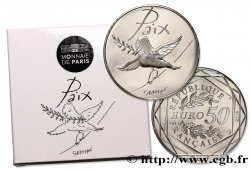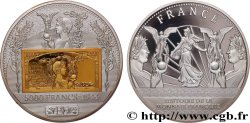fme_888571 - GREAT-BRITAIN - VICTORIA Médaille, Tunnel de la Tamise, Rotherhite Entrance
65.00 €(Approx. 75.40$ | 56.55£)
Quantity
Add to your cart

Type : Médaille, Tunnel de la Tamise, Rotherhite Entrance
Date: 1842
Mint name / Town : UK, Londres
Metal : tin
Diameter : 43,5 mm
Orientation dies : 12 h.
Engraver DAVIS BIRM.
Weight : 26,01 g.
Edge : lisse
Puncheon : sans poinçon
Coments on the condition:
Patine grise hétérogène, présentant de l’usure sur les reliefs. Des frottements dans les champs. Présence de quelques coups et rayures
Obverse
Obverse legend : SIR ISAMBART MARC BRUNEL . F. R. S. & C..
Obverse description : Tête nue à gauche, signé : DAVIS BIRM..
Reverse
Reverse legend : ROTHERHITE / ENTRANCE // THAMES TUNNEL 1200 FEET LONG / COMMENCED 1824. CMPLETED 1482 / 76 FRETELOW HIGH WATEM / COST L. 450 000 / - / SIR I.M. BRUNEL ENGINEER..
Reverse description : Vue du tunnel sous la Tamise.
Commentary
Le Tunnel sous la Tamise est un tunnel sous-fluvial passant sous la Tamise, à Londres. Il est large d'environ 11 mètres, haut d'environ 6 mètres et long d'environ 396 mètres.
Construit entre 1825 et 1843 grâce à la technique du tunnelier récemment inventée par le comte Thomas Cochrane et Marc Isambart Brunel, il est le premier tunnel connu à avoir été construit sous une rivière navigable.
Il est transformé en tunnel ferroviaire pour être intégré en 1869 à l'East London Railway, composante du Métro de Londres à partir de 1933, puis du London Overground depuis 2011.
Il ne doit pas confondu avec le tunnel de Rotherhithe (en), ouvrage routier situé à environ 500 mètres en aval.
The Thames Tunnel is a river tunnel under the River Thames in London. It is approximately 11 metres wide, approximately 6 metres high and approximately 396 metres long. Built between 1825 and 1843 using the tunnel boring machine technique recently invented by Count Thomas Cochrane and Marc Isambart Brunel, it is the first known tunnel to have been built under a navigable river. It was converted into a railway tunnel and incorporated in 1869 into the East London Railway, which became part of the London Underground in 1933 and became part of the London Overground in 2011. It should not be confused with the Rotherhithe Tunnel, a road structure located approximately 500 metres downstream.
Construit entre 1825 et 1843 grâce à la technique du tunnelier récemment inventée par le comte Thomas Cochrane et Marc Isambart Brunel, il est le premier tunnel connu à avoir été construit sous une rivière navigable.
Il est transformé en tunnel ferroviaire pour être intégré en 1869 à l'East London Railway, composante du Métro de Londres à partir de 1933, puis du London Overground depuis 2011.
Il ne doit pas confondu avec le tunnel de Rotherhithe (en), ouvrage routier situé à environ 500 mètres en aval.
The Thames Tunnel is a river tunnel under the River Thames in London. It is approximately 11 metres wide, approximately 6 metres high and approximately 396 metres long. Built between 1825 and 1843 using the tunnel boring machine technique recently invented by Count Thomas Cochrane and Marc Isambart Brunel, it is the first known tunnel to have been built under a navigable river. It was converted into a railway tunnel and incorporated in 1869 into the East London Railway, which became part of the London Underground in 1933 and became part of the London Overground in 2011. It should not be confused with the Rotherhithe Tunnel, a road structure located approximately 500 metres downstream.








 Report a mistake
Report a mistake Print the page
Print the page Share my selection
Share my selection Ask a question
Ask a question Consign / sell
Consign / sell
 Full data
Full data















